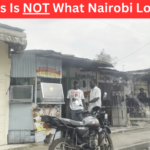Thanks to my real estate investment journey, I’ve had the privilege of working with people from various countries and continents. This has given me a deeper understanding of their work ethics—far beyond what a surface-level experience as a tourist could provide.
In particular, I’ve been amazed by the hustle culture in Asia and Africa. It’s a mentality that combines relentless drive, creativity, and resilience, making these regions stand out not just as emerging economic powerhouses but also as hubs of human ambition and innovation.
The Hustle Mentality: Asia and Africa vs. Europe
In Europe, work-life balance is sacrosanct. Most professionals strictly adhere to office hours. If I want to discuss property investments, it often means waiting until the next working day, as weekends and evenings are generally off-limits.
While this system reflects a commitment to personal time, it contrasts sharply with the relentless hustle I’ve encountered in Asia and Africa. Here, business doesn’t sleep. Whether it’s late at night, early morning, or over the weekend, professionals are ready to respond.
For example, I recently reached out to a Kenyan lawyer on a Saturday morning. Within hours, he provided me with a comprehensive contract and a detailed plan to finalize my real estate deal. On another occasion, a Vietnamese real estate agent spent his Sunday morning taking me around Ho Chi Minh City on his scooter to visit various plots of land.

Efficiency, Resourcefulness, and Personal Touch
One of the things I love most about the hustle culture in these regions is their incredible efficiency and resourcefulness. When I inquire about an opportunity, I often get a response within minutes—sometimes with solutions that go above and beyond my expectations.
For example, in Cambodia, real estate agents don’t just show me properties; they also guide me through banking setups, tax strategies, legal frameworks, and even rental income optimization. Similarly, in Kenya, professionals often package services in a way that’s seamless and easy to navigate, eliminating the need to piece together solutions from multiple sources.
But what truly stands out is the human element. Negotiations in these regions are not just about numbers—they’re personal and relationship-driven. Unlike the rigid, fixed-price approach often seen in Europe, discussions here are opportunities to connect on a deeper level, turning potential deals into collaborative partnerships.

For example, during one property search in Vietnam, I met the owners of two high-end properties with my agent. What started as a typical meeting quickly transformed into hours of genuine conversation about life, ambitions, and shared values. That connection wasn’t just refreshing—it paid off. Both owners offered me significant discounts, not because of hard bargaining, but because of the rapport we built. Even though I eventually decided not to purchase their properties, the experience stayed with me. It wasn’t just business; it was a reminder of how meaningful human connections can be.
This unique blend of efficiency, resourcefulness, and genuine connection makes every interaction in these regions memorable. It turns simple transactions into experiences that feel personal, enriching, and rewarding.
Challenges of Hustle Culture
Sure, no system is without its drawbacks. The hustle-driven environments in Asia and Africa come with their own challenges—bureaucracy, corruption, and lack of transparency can sometimes complicate the process. However, the dedication and creativity of the people I’ve worked with more than make up for these shortcomings.
Personal Reflection: Rediscovering My Own Hustle
Experiencing the hustle culture firsthand has been like holding up a mirror to my past. Years ago, when I was managing my affiliate marketing businesses, hustle wasn’t just part of my work—it was my identity. Whether it was a call on Christmas morning or a client needing help at 11 p.m., I was there, ready to respond. It wasn’t about clocking in hours; it was about embodying a relentless commitment to those I worked with.
These days, my career as a hobby investor and blogger flows at a slower, more intentional pace. Yet, there are moments when my old hustle resurfaces. Whether it’s calling a Vietnamese broker at 5 a.m, texting a Kenyan agent late at night, or sealing a deal on a Sunday afternoon, I’m reminded that the spirit of hustle is still very much alive in me. It’s not a relic of the past—it’s an intrinsic part of who I am.
Hustle isn’t just about working hard—it’s about showing up with presence, adaptability, and a genuine willingness to go the extra mile. These traits build meaningful connections in a world often overshadowed by transactional relationships. Seeing this dedication in others not only inspires me but also rekindles my own drive. It reminds me of the importance of consistently exceeding expectations and offering value to those I work with—not because it’s required, but because it’s the right thing to do.
Why Hustle Matters: Lessons from Global Economic Transformations
What do Vietnam, Cambodia, and Kenya have in common? Beyond their historical struggles and economic obstacles, they share an unyielding drive for success—a relentless hustle that has propelled them from poverty to become some of the world’s fastest-growing economies.
In just two decades, these nations have defied expectations and shown the world that with resilience, innovation, and relentless effort, significant transformation is possible. Their rise serves as a powerful reminder that success is shaped not by the resources you have, but by the hustle and mindset you bring to the table:
Vietnam: A country once defined by poverty has become one of Asia’s most vibrant economies. In 2000, Vietnam’s GDP was just $31 billion; by 2020, it had skyrocketed to over $330 billion. This transformation was driven by a booming manufacturing sector, foreign investment, and rapid urbanization. Vietnam’s poverty rate plummeted from 58% in the 1990s to just 5% in 2020—a shift that demonstrates how sustained effort and sound strategy can uplift millions. You can explore a detailed analysis of Vietnam’s economic rise in my other post here.
Cambodia: Steady 7% annual GDP growth for over two decades has reshaped Cambodia’s economy. Its GDP per capita climbed from a mere $300 in 2000 to nearly $1,700 by 2023, driven by industries like garment manufacturing, tourism, and construction. Phnom Penh’s skyline is now dotted with modern skyscrapers, a visual testament to the country’s economic ascent and ambition. You can explore a detailed analysis of Cambodia’s economic rise in my other post here.
Kenya: Known as East Africa’s economic hub, Kenya has undergone a remarkable transformation. Its GDP rose from $12 billion in 2000 to over $114 billion in 2023. The nation’s embrace of technology, particularly innovations like the mobile money system M-Pesa, has revolutionized financial inclusion and spurred entrepreneurship.

This reminds me of 2017, when I co-owned a company in Malaysia. Back then, I truly believed I was hustling hard, grinding day in and day out. But the moment I saw the relentless drive of my two business partners, it hit me: I had barely scratched the surface. They didn’t just work—they lived and breathed their goals, constantly in motion. It was the first time in my entrepreneurial journey that I fully understood how far Asian entrepreneurs are willing to stretch themselves, often with minimal support and resources, pushing their limits in ways I hadn’t even imagined. It comes as no surprise that both of them have gone on to achieve incredible success. Their relentless hustle and laser-sharp focus made their success inevitable.
These stories, whether at a national or personal level, underscore a powerful truth: relentless hustle, hard work, and an unwavering commitment to goals will take you far.
Conclusion
Call me crazy—but maybe that’s just who I am. Sure, I’m motivated by the potential for high returns, but it’s the thrill of the journey that truly excites me. Investing in frontier and developing countries goes beyond financial opportunities—it satisfies my thirst for adventure and feeds my curiosity. But the real reward is in the connections I forge along the way. More often than not, these business relationships evolve into friendships. We laugh, we share stories, and we stay in touch long after the deals are done. It’s this human element that makes the process feel truly meaningful.
As I look ahead, I’m increasingly drawn to these regions for one simple reason: the incredible dedication, the willingness to go the extra mile, and the shared commitment to adding value. These qualities make every dollar of my investment feel not just spent, but valued.
What about you? Have you had the chance to invest in frontier and emerging markets? What has your experience been like? Have you found the same level of dedication and commitment that I’ve encountered?
***You can read more about all my investments in Kenya in this blog series [here].
Related posts:
 Real Estate Insights: My 2-Week Investment Journey in Ho Chi Minh City (Sept 2024)
Real Estate Insights: My 2-Week Investment Journey in Ho Chi Minh City (Sept 2024)
 Part 6 (Final): Words of Caution
Part 6 (Final): Words of Caution
 How to Start Investing in Crypto with Just $1: A Beginner’s Guide
How to Start Investing in Crypto with Just $1: A Beginner’s Guide
 Two Weeks in Kenya: What I Learned, What I Invested In, and Why I’m Going Back
Two Weeks in Kenya: What I Learned, What I Invested In, and Why I’m Going Back
 The Stereotypes I Had About Kenya—And How Completely Wrong I Was
The Stereotypes I Had About Kenya—And How Completely Wrong I Was
 Vietnam Real Estate Investment 2025: Critical Risks, New Regulations & Insider Tips for Foreign Investors
Vietnam Real Estate Investment 2025: Critical Risks, New Regulations & Insider Tips for Foreign Investors

